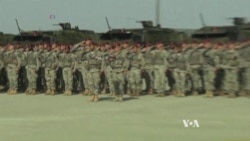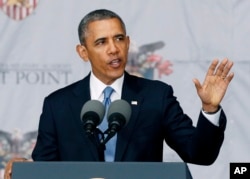LONDON —
In recent months, U.S. President Barack Obama has faced criticism that his approach to foreign policy has been too cautious, emboldening adversaries such as Syria, China and Russia. The White House argues the projection of power involves more than military might. Whether or not the United States still plays the role of the world’s policeman is in question.
Dozens of men, women and children lie dead or dying after an apparent chemical weapons attack by Syrian government forces on the Damascus suburb of Ghoutta last August.
Syria’s President Bashar al Assad had crossed one of Washington’s stated red lines, but faced no military consequence. That was a pivotal moment, says Xenia Dormandy of London-based policy institute Chatham House.
“Nobody really believes America’s red lines in quite the same way as they used to because ... Assad was allowed to walk over those red lines without consequence,” said Dormandy.
'Paper tiger'
Dormandy said the United States remains by far the world’s biggest military and economic power, and the perception that it is unwilling to use its muscle is dangerous. “If countries - say for example China - believe that they can take over territory, as Russia did in the case of the Crimea, without consequence, they will cross red lines that they do not see causing a U.S. or a Western response.”
Russia’s armed takeover of Crimea in March prompted criticism that a cautious approach by the United States’ had emboldened other world powers.
The West had few military options, however, according to Professor Arne Westad of the London School of Economics.
“Its options of course under any circumstance, going back to the end of the Cold War in the early 1990s, would have been very limited. Russia after all is a nuclear weapons state,” said Westad.
Ukrainians recognize such limitations, said Orysia Lutsevych, a Ukraine specialist at Chatham House. “Ukrainians are really cautious, and understanding that an outright military confrontation that will be backed by the United States would be difficult and it will cause a lot of casualties.”
In a speech to military graduates last month, Obama said it would be wrong to launch military operations simply to avoid America looking weak.
"I would betray my duty to you, and to the country we love, if I ever sent you into harm's way simply because I saw a problem somewhere in the world that needed to be fixed,"said Obama.
Give and take
Many allies in Asia rely on the so-called U.S. security umbrella as a counterweight to growing Chinese power. Washington is war-weary after tough campaigns in Afghanistan and Iraq, though, and wants its allies to step up to the plate, according to Dormandy.
“But acting together is about building coalitions. And so this assumption that they have long held and many in Europe have long held that America will be first, America will put the resources out on the table and they just need to back it up, is no longer true,” said Dormandy.
U.S. ally Japan plans to allow its military a greater role in global security, prompting Chinese anger.
But analysts say the change in policy is welcomed in Washington, where policymakers are happy for the United States to take the lead, but want more support in return.
Dozens of men, women and children lie dead or dying after an apparent chemical weapons attack by Syrian government forces on the Damascus suburb of Ghoutta last August.
Syria’s President Bashar al Assad had crossed one of Washington’s stated red lines, but faced no military consequence. That was a pivotal moment, says Xenia Dormandy of London-based policy institute Chatham House.
“Nobody really believes America’s red lines in quite the same way as they used to because ... Assad was allowed to walk over those red lines without consequence,” said Dormandy.
'Paper tiger'
Dormandy said the United States remains by far the world’s biggest military and economic power, and the perception that it is unwilling to use its muscle is dangerous. “If countries - say for example China - believe that they can take over territory, as Russia did in the case of the Crimea, without consequence, they will cross red lines that they do not see causing a U.S. or a Western response.”
Russia’s armed takeover of Crimea in March prompted criticism that a cautious approach by the United States’ had emboldened other world powers.
The West had few military options, however, according to Professor Arne Westad of the London School of Economics.
“Its options of course under any circumstance, going back to the end of the Cold War in the early 1990s, would have been very limited. Russia after all is a nuclear weapons state,” said Westad.
Ukrainians recognize such limitations, said Orysia Lutsevych, a Ukraine specialist at Chatham House. “Ukrainians are really cautious, and understanding that an outright military confrontation that will be backed by the United States would be difficult and it will cause a lot of casualties.”
In a speech to military graduates last month, Obama said it would be wrong to launch military operations simply to avoid America looking weak.
"I would betray my duty to you, and to the country we love, if I ever sent you into harm's way simply because I saw a problem somewhere in the world that needed to be fixed,"said Obama.
Give and take
Many allies in Asia rely on the so-called U.S. security umbrella as a counterweight to growing Chinese power. Washington is war-weary after tough campaigns in Afghanistan and Iraq, though, and wants its allies to step up to the plate, according to Dormandy.
“But acting together is about building coalitions. And so this assumption that they have long held and many in Europe have long held that America will be first, America will put the resources out on the table and they just need to back it up, is no longer true,” said Dormandy.
U.S. ally Japan plans to allow its military a greater role in global security, prompting Chinese anger.
But analysts say the change in policy is welcomed in Washington, where policymakers are happy for the United States to take the lead, but want more support in return.






